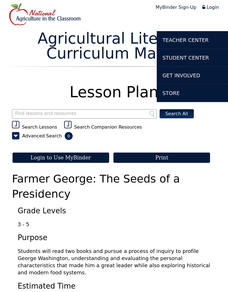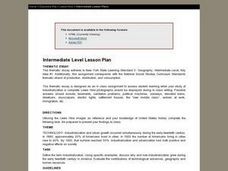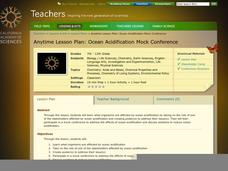Annenberg Foundation
Taming the American West
Have you ever seen a movie about the romance of the American West with its buffalo, horses, cowboys, and endless frontier? The 13th installment of a 22-part series on American history presents the myths associated with the American West....
Curated OER
Technology: Mass Production and Standardization
Learners explore standardization and mass production by creating verbal visual vocabulary tables. They discover how industrial inventions increase profits for businesses. Students create three-tiered definition concept trails using...
Kenan Fellows
Farm to Fuel: The Alternative Fuels Industry
Need a lesson to fuel young minds? A variety of hands-on activities is sure to get your class fired up! Beginning with an introductory slideshow and culminating with group presentations, the week-long unit has something for everyone....
Kenan Fellows
Industrial Knowledge of Acids and Bases
Over a 10-year period, EPA regulations cost businesses less than $30 billion, while businesses saved over $82 billion. Scholars experiment with acids and bases to better understand the pH scale. Then they debate environmental regulation...
Center for History Education
To What Extent Were Women's Contributions to World War II Industries Valued?
Women rose to the challenge when the nation's war effort called them—but were sent home when the GIs came back from World War II. Young historians consider whether the United States valued women's contributions during the war using a...
EngageNY
Tracing the Idea of Fish Depletion: Chapter 2
Scholars read chapter two of World without Fish to learn more about the fishing industry. Learners discuss in triads what it means for fishing to become an industry. They then write the gist of pages 28-33 on sticky notes and answer...
Agriculture in the Classroom
Farmer George: The Seeds of a Presidency
Three activities make up a lesson that explores the connection between former president George Washington, the farming industry, and leadership. Scholars listen to two read aloud, Farmer George Plants a Nation by Peggy Thomas and George...
Curated OER
Writing about the world's fisheries (Calibrated Peer Review)
Students summarize the findings of the Pew Ocean Commission report "America's Living Oceans," contrast it to an opposing viewpoint, and recommend a fisheries policy based on their understanding. It includes a scoresheet that was created...
Curated OER
Lewis Hine
Students define the term Industrialization. They use specific examples, discuss why and how industrialization grew during the early twentieth century in America. Students evaluate the contributions of technological advances, geography...
Curated OER
Division of Labor
Students study the Industrial Revolution and its effects on workers and productivity in order to explain the concepts of division of labor and cottage industry.
Curated OER
Starting a Revolution
Students examine state quarters with images that refer to the Industrial Revolution. They discuss whether or not it is appropriate to commemorate that event. They research the Slater Mill and decide if it should be commemorated.
Curated OER
Historical Witness: Social Messaging
Students research the effects of the Industrial Revolution through art and satire. In this Industrial Revolution instructional activity, students complete a Venn diagram, a symbolism study, a satire study, and complete an art activity to...
Curated OER
Revolutions in Retrospect
Students analyze the social conditions of Victorian England and focus on the woman's place in Victorian society. In this Victorian England instructional activity, students read excerpts of Victorian writers and their take on the...
EngageNY
Further Research: Industrial Food Chain
Scholars extend their research of the food chain that Michael Pollan discusses in The Omnivore's Dilemma. They determine additional consequences of the food chain and add them to their Cascading Consequences charts. Additionally, pupils...
EngageNY
Reading for Gist, Answering Text-Dependent Questions, and Determining Author’s Purpose: Industrial Food Chain
A Reading Closely: Guiding Questions handout leads readers to discover the gist of The Omnivore’s Dilemma. While reading, pupils look closely at the words in the text and discuss their meaning. They use dictionaries when needed to answer...
EngageNY
Reading for Gist, Answering Text-Dependent Questions, and Determining Author’s Purpose: Industrial Organic Food Chain
After re-reading The Omnivore’s Dilemma using a Reading Closely: Guiding Questions handout, class members use sticky notes to annotate and determine the gist of the text. Finally, they use an Author’s Purpose graphic organizer to...
Curated OER
Women and Korean Literature
Learners read a text about women in Korean and their role in Korean literature. For this Korean literature lesson, students read a text by Helen Koh to learn about women writers in Korea.
California Academy of Science
Ocean Acidification Mock Conference
In a comprehensive role playing activity, teens play the parts of different stakeholders in the realm of acidic oceans. They research, debate, and create a presentation from the perspective of either ocean organisms, the fishing...
Safe Drinking Water Foundation
Cause and Effect of Water Pollution
Your students will become aware of and be able to list the major types and sources of water pollution. Being able to recognize that the household, agriculture, and industry sectors of society contribute to water pollution, is the main...
Curated OER
Healthy Foods
Students view a video which explores the following statement. "You are what you eat." They discuss the food industry, organic foods, and healthy food choices. They chart what they eat on a daily basis and make plans for healthier options.
Alabama Department of Archives and History
Cells for Sale - Convict Leasing in Alabama
The benefits and drawbacks of convict leasing following the Civil War are the focus of a instructional activity that asks groups to examine primary source materials to gain an understanding of the program before individuals decide...
Constitutional Rights Foundation
Automation and the American Worker
A thought-provoking resource examines the future of automation and the effects on employment. Academics read informational text, complete written prompts, and participate in activities to understand automation and the possibilities for...
DocsTeach
Patent Analysis: Wright Brothers' Flying Machine
Ideas take flight in an exciting activity exploring the Wright Brothers. Scholars view the Wright Brothers' patent for their flying machine and makes educated guesses as to the purpose of the document. Scholars discuss the purpose of...
Curated OER
Global Warming: Life in a Greenhouse
Students examine the evidence that scientists have used to support the existence of global warming and the greenhouse effect. How the concepts have been developed and evaluated form the focus of this lesson plan.
Other popular searches
- Fisheries
- Radio Industry
- "Technology" Industry
- Auto Industry
- Music Industry
- Cattle Industry
- Automotive Industry
- Automobile Industry
- Film Industry
- Fishing Industry
- Aviation Industry
- Forest Industry

























